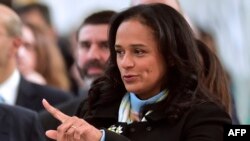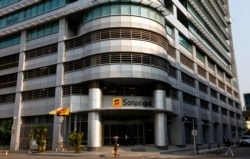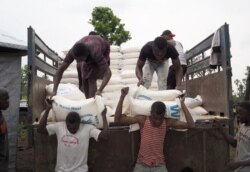Angolan activists say the recent "Luanda Leaks" investigation — which uncovered billions of dollars’ worth of unscrupulous business dealings that made the daughter of Angola's longtime president, the richest woman in Africa — is just the tip of the iceberg when it comes to corruption in the oil-rich African country.
When they came out last month, the 700,000 documents in the “Luanda Leaks” investigation — carried out by the International Consortium of Investigative Journalists — shed light on a tangled web of illicit dealings centered around Isabel dos Santos, the daughter of former Angolan president Jose Eduardo dos Santos.
But, Angolan activists say there’s much, much more to come.
Peace activist Daniel Ntongi-Nzinga says corruption in the southern African country neither starts nor stops with the former president’s daughter.
“I don't see a single day that newspapers don't talk about Isabel Dos Santos," he said. "Almost every day, more than two or three articles will come out. More than five or six statements are being done on Isabel. I find it very strange. But the billions that disappeared in Angola, it did not all go with Isabel. There are many others.”
Isabel Dos Santos has repeatedly denied the corruption allegations — including to VOA — and claims the legal case against her is politically motivated.
During her father’s 38-year-rule, she was appointed to the head of the national oil company. Her brother was made head of the sovereign wealth fund.
Since her father stepped down in 2017, his former ally, President Joao Lourenco, has mounted an anti-corruption drive that appears to center on the former first family. That, along with the government’s reluctance to prosecute the former vice president, a top Lourenco ally, has led critics to ask whether he is actually trying to destroy corruption — or the dos Santos family.
Human rights researcher David Matsinhe, of Amnesty International, says that for many suffering Angolans, this is an academic question.
Some 2.3 million people in southern Angola are suffering from a drought and food insecurity. Their plight is likely to continue, Matsinhe says, because the nation’s coffers were drained by corruption.
“Corruption undercuts the government's ability to provide services such as education, such as health care, construction of infrastructure and telecommunication systems, irrigation systems, all of those are ways in which the government can use the funds to fulfill human rights, to defend human rights, promote them. But when the government becomes defunded because of corruption, that becomes a problem. There's a clear link,” said Matsinhe.
Angola is one of the world’s most unequal societies, despite its vast oil wealth, and was ranked in the world’s 14th most corrupt country by Transparency International.
Anti-corruption campaigner and journalist Rafael Marques de Morais says corruption in Angola is a story that can be mined for years to come.
“Luanda Leaks is just the tip of the iceberg," he said. "There are many other cases involving tens of billions of dollars that have been diverted from Angola and some of that information is public. But Luanda Leaks is just a good soundbite for the international media because it involves Isabel dos Santos, who has been glamorized abroad as the richest African woman."
"Stay tuned," he said.
VOA's Portuguese Service contributed to this report.


